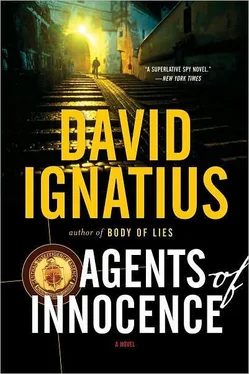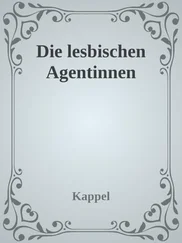David Ignatius - Agents of Innocence
Здесь есть возможность читать онлайн «David Ignatius - Agents of Innocence» весь текст электронной книги совершенно бесплатно (целиком полную версию без сокращений). В некоторых случаях можно слушать аудио, скачать через торрент в формате fb2 и присутствует краткое содержание. Жанр: Шпионский детектив, на английском языке. Описание произведения, (предисловие) а так же отзывы посетителей доступны на портале библиотеки ЛибКат.
- Название:Agents of Innocence
- Автор:
- Жанр:
- Год:неизвестен
- ISBN:нет данных
- Рейтинг книги:3 / 5. Голосов: 1
-
Избранное:Добавить в избранное
- Отзывы:
-
Ваша оценка:
- 60
- 1
- 2
- 3
- 4
- 5
Agents of Innocence: краткое содержание, описание и аннотация
Предлагаем к чтению аннотацию, описание, краткое содержание или предисловие (зависит от того, что написал сам автор книги «Agents of Innocence»). Если вы не нашли необходимую информацию о книге — напишите в комментариях, мы постараемся отыскать её.
Agents of Innocence — читать онлайн бесплатно полную книгу (весь текст) целиком
Ниже представлен текст книги, разбитый по страницам. Система сохранения места последней прочитанной страницы, позволяет с удобством читать онлайн бесплатно книгу «Agents of Innocence», без необходимости каждый раз заново искать на чём Вы остановились. Поставьте закладку, и сможете в любой момент перейти на страницу, на которой закончили чтение.
Интервал:
Закладка:
The air was soft and fragrant, scented with traces of olive and mint. It was early fall, the start of that long, blissful season before winter. Rogers cradled his daughter against his chest and carried her to the red-and-white Middle East Airlines bus for the ride to the terminal. The other passengers smiled as they gave up their seats for Rogers’s wife and children. A man offered Rogers’s son a piece of candy.
“We love children,” said the man in English, as if speaking for the entire Arab world.
“Shokran,” said Rogers’s son, using the Arabic word for thank you. The passengers beamed. How cute. How innocent.
Rogers listened to the buzz of Arabic voices on the bus: Lebanese accents, mostly; a few Palestinian; a few Egyptian. Most of them were talking about how good it was to be back in Beirut.
A fellow passenger might have guessed that Rogers was a college professor visiting Lebanon with his family to teach for a year at the American University of Beirut, or perhaps a journalist assigned to Beirut by one of the big American newspapers. He was tall and thin, wearing a worn corduroy suit. He had a slightly disheveled look: a shock of dark hair not quite combed, his white shirt fraying slightly at the collar, his suit jacket missing a button on the sleeve. He was wearing reading glasses to study the customs forms: they were half-glasses, made of tortoise shell, perched on the middle of his nose so that he seemed always to be looking over the top of them. As Rogers stared out the window of the bus toward the hills above the airport, he had a blank expression. The look of a man lost in thought, or perhaps lost in the absence of thought.
The bus deposited the passengers at the terminal. Rogers presented his diplomatic passport to the Lebanese policeman at passport control. The policeman looked at him and smiled the thin, corrupt smile of immigration officers around the world. Rogers could almost hear the click of the shutter as a camera somewhere took his picture. He studied the policeman’s face and wondered, for an instant, how many different intelligence services had bought a piece of him.
Rogers hailed one of the sorry-looking yellow taxis outside the terminal. He told the driver in crisp Arabic that he wanted to go to the Sarkis Building in the Minara District, near the old Beirut lighthouse. That, he told the children, would be their new home.
“As you like,” said the driver in English. He was shocked that an American-he had to be an American, he was so tall and he wore shoes with laces in them-could speak the language.
Rogers bribed the landlord the first day, in the precise amount suggested by the administrative officer at the embassy. The man was effusively grateful and took to calling Rogers by the honorific, Effendi. Rogers also paid a small bribe to the doorman, who mattered a good deal more to the happiness and security of his family. He was a dark-skinned man who had come to Lebanon several decades ago from Assiut, in upper Egypt, and never left. He liked to be addressed by the Egyptian term for doorman: Bawab.
The apartment was vast and bright. It was laid out like a villa, with a large living room and dining room for entertaining, surrounded by bedrooms, a library, a playroom, and a maid’s room. The center of the apartment was a large screened porch overlooking the Mediterranean. From the porch, you could watch the fishermen heading out to sea in their skiffs in the morning, and you could hear the crash of the waves against the rocky coast, 200 feet below. It was an apartment where a family could live richly and stylishly, in the Lebanese way.
Jane took the children on forays to scout out the neighborhood. There was Smith’s market on Sadat Street, which seemed to have every spice and condiment-every canned, potted, and dried food imaginable-from around the world. A few doors down was the ice-cream man selling the Arab version of ice cream, sweeter than sweet, with a texture and flavor almost like pudding. In an alley was a tiny shop that sold coffee, mixed with spices in the Arab way, and on a summer day the whole of Sadat Street seemed to smell of cardamom.
Across the street was a florist, selling the most delicate flowers: orchid and rose, iris and gladeolus. The owner was a burly Sunni Moslem man, completely bald, who had the appearance and manner of a Turkish wrestler. It was a incongruous sight: this huge bull of a man, gently wrapping flowers for the fine ladies of Beirut.
The fall social season began in Moslem West Beirut soon after Rogers arrived. The shops in the Place des Canons twinkled with lights and the city was swept along by a tide of self-congratulation and good cheer.
It was the season for frantic partying: a prominent Lebanese doctor who worked for Aramco threw a farewell bash for himself at the Phoenicia Hotel; he was departing, poor man, for Saudi Arabia and received many condolences; in the Sunni neighborhood of Koreitem, the Moslem ladies of the Beirut College for Women were beginning rehearsals for their annual concert of Christmas music; in a similar spirit of ecumenicism, the International Women’s Club of Beirut was planning its fall tour of churches and mosques.
Hamra Street, the grand boulevard of the new Lebanon, was crowded with shoppers, peering in the windows at the latest dresses from Paris, shoes from Italy, books from London and New York. This was the precinct of Lebanon’s new money, where the middle class flocked to buy fashion, culture, respectability. The language in the shops was French, perhaps a little English, but certainly not Arabic, which represented a culture the Lebanese were rushing to escape.
“Les deracinees” was what the old feudal lords liked to call the young men who had come down from the mountains to build this new Beirut. The Uprooted. They inhabited a city that had slipped its old moorings and was drifting happily and obliviously into the future.
Beirut in 1969 was a border town, whose residents fancied their city as the last outpost of Europe, even though it stood on the landmass of Asia, at the frontier of Islam and the Orient. It was a city of confluence, where two cultures-East and West-met to produce a steaming and sensuous vortex, like the collision of two ocean currents.
Living on the border, the Lebanese felt the tremors of the 1960s from both directions. The Arabic papers were breathless with the latest impossible news from America: A man on the Moon. The Sharon Tate murders. Hippies. Vietnam. The headlines conveyed a sense of upheaval and rebellion at the center of the world, which gave people at the periphery a feeling of power and dread, like peasants watching the feudal manor burn to the ground.
Beirutis liked to call their city “the Paris of the Orient,” but it often seemed more like the Hong Kong of Europe. Beirut had a quality often found in the Third World, a tendency toward ostentation and self-parody. A Lebanese host would provide his visiting Saudi friends with two voluptuous whores each, rather than just one. The Armenian tailor on Hamra Street learned that he could sell more suits by raising his prices, and calling each garment a “special” model, than by lowering them. On Lebanon’s Middle East Airlines, the first-class seats were always sold out, while tourist class was nearly empty. The Lebanese national motto seemed to be: A thing worth doing is worth overdoing.
A headline in one of the local papers conveyed the national mood. It read: “Super Scheme to Turn Lebanon into Dream Country Aired; Project Said Easy to Achieve.” The scheme in question was to build elevated highways to handle the crush of city traffic. It would cost a staggering $350 million, a hopeless sum for a nation that couldn’t even raise enough tax revenues to collect the garbage.
It was all very exhilarating to the Lebanese. But outsiders saw the warning signs that most Beirutis ignored. The government bureaucracy had become so corrupt that it had difficulty performing the services for which officials solicited bribes. The old aristocracy had become so cynical that it was using radical rhetoric and gangs of armed thugs to maintain political power, and in so doing was unleashing forces that threatened to bring down the regime.
Читать дальшеИнтервал:
Закладка:
Похожие книги на «Agents of Innocence»
Представляем Вашему вниманию похожие книги на «Agents of Innocence» списком для выбора. Мы отобрали схожую по названию и смыслу литературу в надежде предоставить читателям больше вариантов отыскать новые, интересные, ещё непрочитанные произведения.
Обсуждение, отзывы о книге «Agents of Innocence» и просто собственные мнения читателей. Оставьте ваши комментарии, напишите, что Вы думаете о произведении, его смысле или главных героях. Укажите что конкретно понравилось, а что нет, и почему Вы так считаете.












